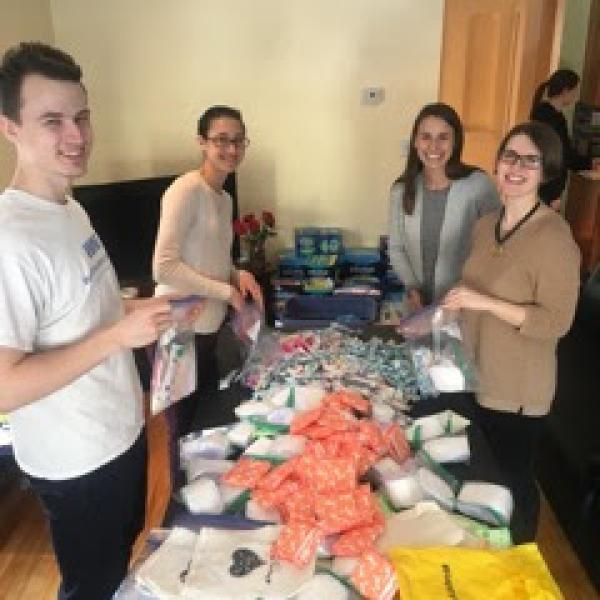NHC Alum Catherine Gilligan Creates Hygiene Kits for People in Need

Catherine Gilligan (NHC 2015-2016) reflects on completing a service project with support from an NHC Alumni Grant.
The financial strain of menstruation is often overlooked but can be significant. If you consider how many days in her life a woman spends menstruating and then how many pads or tampons she uses on each day of her period, the cost quickly adds up. Growing up in a middle class family, I never worried about the cost of feminine hygiene products. They were ubiquitously in the bathroom cabinet, brought home every couple of months by my mom. When I got to college and started buying my own supplies, I started to understand how expensive they can be. But still, I never worried too much about not having access to the products and the most strain I felt was buying generic to save a few bucks. Coming from a place of privilege, buying pads and tampons was never a major source of stress in my life. But imagine you are without a home or job, or living paycheck to paycheck where every cent goes toward rent and feeding your family. Suddenly, spending $6 on a box of tampons every month is an astronomical cost that may cause you to cut costs in other aspects of your life. Six dollars to many people is a tiny amount, but for someone with no disposable income and nothing left over after paying bills and expenses, it is overwhelming.
This was the motivation behind starting a chapter of Happy Period. Happy Period is an organization that aims to provide feminine hygiene products to low-income women in need. This issue is not just a financial one. If a woman does not have access to adequate supplies and begins menstruating, it becomes an issue of hygiene and health as well. If she is living on the streets, stains could ruin some of the few items of clothing she has with her. If she has limited access to tampons, she may keep her tampon inserted for days, increasing her risk of infection. If there is limited access to a shower, she may struggle to feel clean during her period. Menstruation can be a taboo subject. Women often feel the need to hide their menstruation as if it were a secret that half of the population bleeds every month. Regardless of whether menstruation should be taboo or not, a period stain can be a source of embarrassment and shame for many women.
With Happy Period, the goal is to collect donations of feminine hygiene products or use donated money and grants to purchase supplies. With our most recent grant, we were able to purchase about $500 worth of pads and tampons. At our “Packing Party”, many volunteers got together to assemble kits for distribution. Each kit is intended to contain enough products for 2 months and we were able to make about 200 kits. Each volunteer will then keep a few kits in their cars. These are intended to be distributed whenever someone identifies a person who may be in need. For example, a kit may be given to a woman standing on a corner outside of a grocery store asking for money. Most of the kits, however, are grouped so that they can be donated to one of several organizations in the area that can then distribute them. Haven is a shelter for survivors of sexual assault and intimate partner violence who will house survivors and their children until they can be connected to a safe place to live. Hope Warming Shelter and South Oakland Shelter are nightly shelters for those experiencing homelessness. Although many of their clients are men, they see a good number of female clients as well. River Rouge High School has a Teen Clinic which offers free health care for low-income students. Although we are not directly working at these organizations, we have heard nothing but positive responses when we donated kits to them. While food and clothing are often donated to these places, hygiene products, especially pads and tampons, are also an area of huge need. In following up with these organizations, almost all of them distributed the kits to clients and patients within a couple of weeks.
Happy Period has a simple premise: provide pads and tampons to women who may struggle to afford them. It is not complicated in its mission and has honestly been quite easy to implement in my community. Of course, money is our biggest constraint and our dollars never seem to go far enough. We are exploring other options for obtaining donations such as collection boxes in public spaces or reaching out to hospitals and doctors’ offices. Our plan is to continue holding packing parties and distributing supplies as long as we are able. We know that we will never be able to make menstrual products completely free and accessible, but we hope to make a small difference in as many women’s lives as possible.